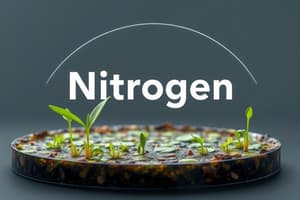Podcast
Questions and Answers
What primarily provides energy in a grazing food chain?
What primarily provides energy in a grazing food chain?
- Microbial biomass
- Carnivores
- Plant energy (correct)
- Dead organic matter
What is a characteristic of food webs?
What is a characteristic of food webs?
- They connect different types of organisms at various trophic levels. (correct)
- They consist of only one food chain.
- They are simple linear sequences.
- They are unstable compared to food chains.
Why do ecosystems with complex food webs have greater stability?
Why do ecosystems with complex food webs have greater stability?
- Each species relies solely on one other species for survival.
- They are composed only of carnivorous organisms.
- They operate as isolated linear sequences.
- They have numerous options available at each trophic level. (correct)
Which statement is true regarding detritus food chains?
Which statement is true regarding detritus food chains?
What is the main feature of ecosystems in tropical regions compared to Antarctic ecosystems?
What is the main feature of ecosystems in tropical regions compared to Antarctic ecosystems?
What is the primary way nitrogen is fixed in the atmosphere?
What is the primary way nitrogen is fixed in the atmosphere?
Which of the following compounds is produced as a result of ammonification?
Which of the following compounds is produced as a result of ammonification?
Which process involves the conversion of nitrates back into molecular nitrogen?
Which process involves the conversion of nitrates back into molecular nitrogen?
What percentage of the atmosphere is composed of nitrogen in its molecular form (N2)?
What percentage of the atmosphere is composed of nitrogen in its molecular form (N2)?
During the decomposition of organic matter, which group of bacteria converts organic nitrogen into ammonia?
During the decomposition of organic matter, which group of bacteria converts organic nitrogen into ammonia?
What is the significance of nitrification in the nitrogen cycle?
What is the significance of nitrification in the nitrogen cycle?
Which of the following processes can lead to eutrophication?
Which of the following processes can lead to eutrophication?
What role do plants play in the nitrogen cycle?
What role do plants play in the nitrogen cycle?
Which type of desert has cold winters and warm summers?
Which type of desert has cold winters and warm summers?
What adaptation helps desert plants reduce water loss during transpiration?
What adaptation helps desert plants reduce water loss during transpiration?
What is a characteristic feature of pond ecosystems?
What is a characteristic feature of pond ecosystems?
Which zone in a lake ecosystem is known for effective penetration of solar light?
Which zone in a lake ecosystem is known for effective penetration of solar light?
Why do desert animals typically have thick outer coverings?
Why do desert animals typically have thick outer coverings?
What is a common anthropogenic pressure that affects pond ecosystems?
What is a common anthropogenic pressure that affects pond ecosystems?
What type of plant adaptation involves the flattening of stems to perform photosynthesis?
What type of plant adaptation involves the flattening of stems to perform photosynthesis?
Which of the following describes the nutrient status of desert soil?
Which of the following describes the nutrient status of desert soil?
Which trophic level has the largest population in a forest ecosystem?
Which trophic level has the largest population in a forest ecosystem?
What does the pyramid of numbers in a grassland ecosystem imply?
What does the pyramid of numbers in a grassland ecosystem imply?
What type of pyramid is formed in a parasitic food chain?
What type of pyramid is formed in a parasitic food chain?
Which of the following represents secondary consumers in a forest ecosystem?
Which of the following represents secondary consumers in a forest ecosystem?
How is the pyramid of biomass different from the pyramid of numbers?
How is the pyramid of biomass different from the pyramid of numbers?
Which organisms act as hyperparasites in the described food chain?
Which organisms act as hyperparasites in the described food chain?
What is the primary role of big trees in a forest ecosystem?
What is the primary role of big trees in a forest ecosystem?
Why does the pyramid of biomass in a forest likely appear upright?
Why does the pyramid of biomass in a forest likely appear upright?
What does the 'I' in the universal energy flow model represent?
What does the 'I' in the universal energy flow model represent?
In a single channel energy flow model, energy flows in what manner?
In a single channel energy flow model, energy flows in what manner?
What phenomenon results in the gradual decline of energy levels at each trophic level in a grazing food chain?
What phenomenon results in the gradual decline of energy levels at each trophic level in a grazing food chain?
In which ecosystem is the grazing food chain likely to predominate?
In which ecosystem is the grazing food chain likely to predominate?
What does the 'R' in the one-way energy flow model signify?
What does the 'R' in the one-way energy flow model signify?
Which model represents two pathways of energy flow operating simultaneously?
Which model represents two pathways of energy flow operating simultaneously?
What does the term 'detritus' refer to in ecological energy models?
What does the term 'detritus' refer to in ecological energy models?
Which component is NOT part of the universal energy flow model?
Which component is NOT part of the universal energy flow model?
Flashcards are hidden until you start studying
Study Notes
Nitrogen Cycle
- Nitrogen constitutes 78% of the atmosphere primarily in the form of N2.
- Nitrogen fixation occurs through lightning or bacteria/cyanobacteria.
- Plants absorb nitrogen for amino acids, proteins, and vitamins, passing it up the food chain.
- Decomposition of dead organisms releases organic nitrogen, converted by ammonifying and nitrifying bacteria into ammonia, nitrites, and nitrates.
- Some bacteria return nitrates to the atmosphere as N2, continuing the nitrogen cycle.
Energy Flow Models
-
Single Channel Model:
- Energy flows unidirectionally from producers to herbivores to carnivores.
- Energy loss occurs at each trophic level, contributing to heat loss.
- Measurements include Gross Primary Production (GPP) and Net Primary Production (NPP).
-
Double Channel Model:
- Recognizes both grazing and detritus food chains, which coexist in ecosystems.
- Grazing chains dominate in marine ecosystems; detritus chains are significant in forest ecosystems.
- Energy in grazing food chains primarily comes from plant energy, while in detritus chains, it derives from plant biomass decomposed by fungi and bacteria.
Food Webs
- Food webs consist of interconnected food chains, providing greater ecosystem stability than linear food chains.
- They offer multiple feeding options, reducing impact if one species declines.
- Antarctic ecosystems demonstrate simple food webs compared to the complex diversity found in tropical regions.
Pyramids of Numbers and Biomass
- Pyramid of Numbers: Shows the quantity of organisms at each level; forests have narrow bases with fewer producers and wider middle levels of herbivores.
- Pyramid of Biomass: Represents the total dry matter at each trophic level; can be upright (like forests) or inverted (like parasitic chains).
Desert Ecosystems
- Deserts exhibit adaptations for water conservation, such as reduced scaly leaves and deep root systems.
- Desert soils are nutrient-rich but water-deficient, resulting in low plant diversity and slower recovery from stress.
Aquatic Ecosystems
- Freshwater Ecosystems: Divided into lentic (standing water, e.g., ponds) and lotic (flowing water, e.g., rivers).
- Pond Ecosystem: Small, stagnant water bodies often subjected to pollution from human activity.
- Lake Ecosystem: Larger bodies of standing water with zones defined by light penetration:
- Littoral zone (shallow, near shore),
- Limnetic zone (open, light-penetrated area),
- Profundal zone (deep, light-deprived area).
Studying That Suits You
Use AI to generate personalized quizzes and flashcards to suit your learning preferences.




